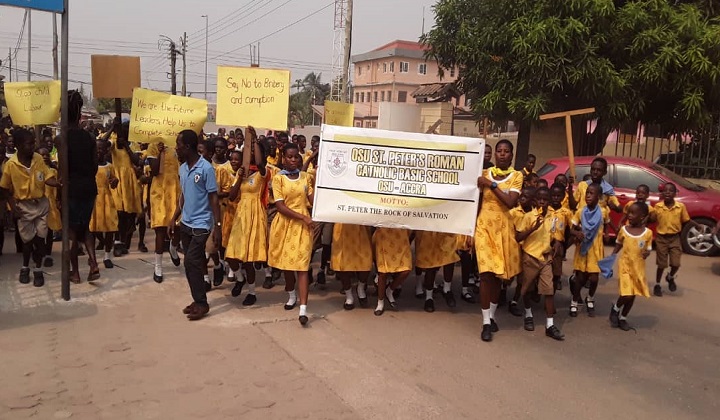The partnership between Religious Bodies and the State in education services delivery dates back to the pre-independence period, which had continued even after, with varying levels of quality and co-operation.
There are countless sources and references that attested to the mutual benefit to both the Church and Government but the partnership in a way had remained fluid and undocumented.
The Catholic Church and indeed most other Christian denominations view education as a joint enterprise among stakeholders, hence there has been a partnership agreement between the Gold Coast (Ghana) Government and Religious Bodies in the management of Schools.
References can be made to important National Policy Documents including, the 1925 Gordon Guggisburg Education Principles, the 1961 Education Act (Article 27) and the 1993 Local Government Act 455 (Article 87).
On October 18, 1999, the then Minister of Education, Ekow Spio Garbrah issued a ministerial directive titled “The Right of Education Units to Manage and Supervise Educational Institutions established and developed by their Respective Religious Bodies in Partnership with the Government”.
On Thursday, April 24, 2008, the then Minister of Education, Science and Sports, Prof. Dominic Fobih, inaugurated a seventeen-member Committee chaired by Prof. Kwasi Ansu-Kyeremeh, “to review the 1999 Partnership Document on education management within the context of current developments in the education sector, which includes the decentralisation of education management”.
In 2017, Ghana’s former Minister of Education, Dr. Matthew Opoku Prempeh at a stakeholder meeting on education in Kumasi hinted that government was in the process of returning the management and supervision of mission schools to religious bodies.
The Catholic Church and the Christian Council of Ghana received the news of government’s move with joy but were of the view that there was the need for a meeting to be held between the government and the religious bodies to draw a road map towards releasing the schools.
“We received the news of the government’s intention to return Mission Schools with great joy. This has been the wish of many for so long. But, let’s get it right; mission schools are properties of the churches. The government assists us because it is its responsibility to educate the population. Educating the population of a country is an immense duty that the State cannot do alone. The churches, therefore, collaborate in this enterprise,” Most Rev. John Bonaventure Kwofie, CSSp, Episcopal Chairman of Education of the Catholic Church in Ghana said in an interview with this writer in reaction to the Minister’s comment.
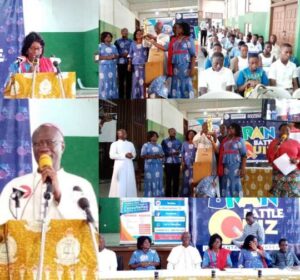
This assistance, the Catholic Archbishop said however, evolved into what seemed like taking over the schools from their rightful owners who have, in some instances, been relegated to the background on account of the lack of clear policies or agreement. “I think returning the mission schools to their owners is a way of recognising the contribution religious bodies have made and the purposes for which they founded Mission schools,” he told this writer.
According to what was reported in the Daily Graphic of Wednesday May 17, 2017 as said by the Minister of Education, “The government will soon return the management and supervision of mission schools to religious bodies.”
Since the pronouncement, the details of this intended arrangement are yet to be given. However, the Honourable Minister of the time, hinted that government “would continue to pay salaries of teachers in mission schools after the appropriate contract had been signed between the government and religious bodies”.
According to the Catholic Archbishop of Accra “Let us note that the Minister made this pronouncement after a stakeholders’ forum on how to improve on the quality of education. I think this is recognition by government that the religious bodies are able partners in the agenda of government for a better quality of education in our country.”
As mentioned earlier, over the years, the Government of Ghana and the Religious Bodies have had a Partnership Arrangement, which allows Religious Bodies to manage their Schools while the government pays the teachers and provides infrastructure and teaching and learning materials. There is the need for the Government to respect the Church’s partnership role by removing the obstacles in the way of the Churches to manage their Schools so that morality, discipline and excellence can be reasonably assured. In recognition of the Churches’ ownership of their Schools, Government should review its representation on the Board of Governors of Mission Schools.
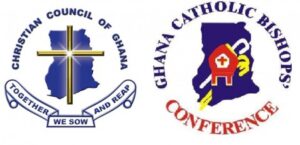
The Partnership between the State and the Church should be a partnership of peace and it is through Mission Schools that they impart an all-round education to the child, with the hope that he or she would grow up to be academically equipped, psychologically balanced, morally upright, socially disciplined and physically fit.
In a joint Press Statement in 2015, members of the Ghana Catholic Bishops’ Conference (GCBC) and Heads of the Member-Churches of the Christian Council of Ghana (CCG) appealed to Government not to ignore Religious and other Bodies who are major stakeholders in education service delivery in Ghana.
“The Religious Leaders have been calling on Government as a matter of urgency, to hasten the signing of the Education Partnership Document and put in place the necessary structures and systems to ensure that it works and is respected by all,” they said.
They said in the 2015 statement “We think that it is truly unfair and objectionable to continue to ignore Religious and other Bodies who are major stakeholders in education service delivery in Ghana.” Religious and other Bodies with schools have partnered the State in education service delivery and this has ensured easy access, academic excellence and holistic moral upbringing of students.
Unfortunately, the absence of any document to guide this Partnership over the years had led to the gradual and systematic weakening of their ( mission churches) stake in education delivery, evident in the lack of collaboration with Educational Managers, and the general frustration of work by some officials of the Ghana Education Service.
Track Record of Faith-Based Organisations (FBOs) in Education
The achievements of FBO’s in education are worth mentioning which include first to introduce formal education in Ghana (Portuguese Catholic Chaplains at Elmina in 1529 and Islamic Koranic schools in Northern Ghana). Faith-Based Organisations have pioneered strategic areas of education such as Technical and Vocational Education, education for girls and disabled children.
FBOs have opened schools in the most deprived Regions and rural areas in Ghana as there is a general public acknowledgement that Mission Schools are among the best schools in the country. Reference can be made from the Senior Secondary Schools Performance League Table. They are also synonymous with discipline, dedication, honesty and commitment to duty.
Without any doubt, Faith-Based schools provide options to parents who wish to give their children religious-based education and are effectively supplementing Government efforts in the education enterprise. Faith-Based schools indeed, facilitate the poor segment of society to have access to top quality education, sometimes surpassing the so-called elite private schools which cost a fortune.
FBOs have very efficient established management structures for education from the community to national level. Basic curriculum for Faith-Based schools has been consistent with national education curriculum and they do participate in the same national assessment exercises where they excel anyway.
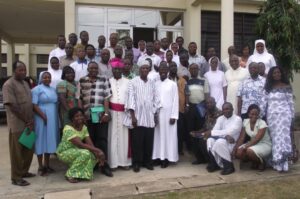
The Catholic Church alone accounts for high percentages of Basic Schools, Senior High Schools, Colleges of Education (former Teacher Training Colleges), Technical and Vocational Schools in the country. Add Islamic, Ahmadiyya and other Christian Mission Schools, makes Religious Bodies next to government in the provision of education.
Challenges to the Partnership
Report of the Committee that reviewed the 1999 Partnership Agreement between the Government and Religious Bodies in the Management of Mission Schools was presented to the Ministry of Education, Science and Sports in July 2008. Since, there hasn’t been any formal approval or rejection of the recommendation.
The Education Act, 2008 that replaced the 1961 Act acknowledged the immense contribution of Religious Bodies to the educational system but failed to define partnership arrangements and relationships between actors in a clear and succinct manner.
Sadly, some Government appointed actors in the Ghana Education Service are taking undue advantage of the void to define education management according to their whims and caprices while some political actors are also playing games with education by their statements, adhoc and sporadic measures and replacing national interest with partisan manifesto agendas.
Some Development Partners are clearly breaching fundamental Aid Policies of especially ownership, by using their development assistance to dictate national frameworks for education in the country. High and frequent incidence of turnover of Ministers of Education. They hardly are settled to the issues, they are removed, and this is quite disruptive of policy negotiation processes. In rather subtle ways, Proprietors, Managers of Faith-Based Institutions, and structures are being excluded or marginalised in allocation of resources, policy information, national dialogues and capacity-building activities.
Majority of Ghanaians remain largely uninformed about the situation and its potential danger to erode quality of education in Ghana. The National Catholic Secretariat, the implementing arm of the Ghana Catholic Bishops’ Conference, for example has taken a giant step to be in partnership with STAR-Ghana to enhance education service delivery and management through the window of redefining and deepening the Partnership between Government and Faith-Based Organisations.
Calls for Review of Partnership
The current educational challenges calls for the Ministry of Education to join hands with Faith- Based Organisations for a national Conference of stakeholders to harmonise and celebrate the wonderful ideas of actualising, in a more meaningful way, the partnership between Government and Faith-Based organisations towards quality education outcomes in Ghana.
Interestingly, the Ghana Catholic Bishops’ Conference and the Christian Council of Ghana have been taken serious steps with Government to review their partnership in education, with the institution of a Joint Committee to review and draft a new Partnership Agreement between Government and the Religious Bodies in management of Mission Schools completing its Report for government in July 2008 but had since not been formalised by Government for endorsement.
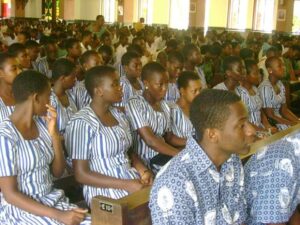
It is an undeniable fact that, Mission Churches especially the Catholic Church see education as one of the means of evangelisation.
The Ghana Catholic Bishops’ Conference in a Communiqué issued in 2004 during its Plenary Assembly in Damongo in the then Northern Region (now Savannah Region) said “We are of the opinion that the issue of the need for the existence of the denominational Schools is not a question of favour being sought but rather a matter of right being claimed. We insist that parents should be offered the opportunity to choose, among several options, the type of education they want for their children.”
“It is for this reason that we find it difficult to accept the practice of sidelining our Unit school system in matters of educational policy. We emphasise that this policy cannot be in the interest of the citizens, the taxpayers, as it deprives them of their choice in such a vital area of life. Fully convinced that a sizeable portion of the Ghanaian citizenry are beneficiaries of Catholic education and specifically seek education in Catholic educational institutions, we hope that a situation of needless confrontation or conflict will not arise where, because the Church’s views are not respected, we are forced to claim our schools back and turn them completely into private ones,” said the GCBC.
The Bishops in 2004 expressed their disillusionment to the lip-service that is paid to the contribution of the Catholic Church to national development. On the one hand, on formal and official occasions, we are told time and time again that the Catholic Church’s contribution to education, healthcare, social welfare, agriculture, provision of potable water, etc., is unparalleled. On the other hand, we are constantly side-lined in matters of policy making and implementation.
With the enormous contributions by the Catholic Church and other Mission Churches, I think Churches should not only be accorded honour, but also must be consulted in matters of the delivery of education in the country. Unfortunately, most of what Churches get is lip-service and a rather weak commitment on the part of the governing institutions that are responsible for providing and supervising education in the country.
Decentralisation of Education Delivery
At the first National Catholic Educational Forum held in 2010 in Kumasi, the participants in a Release signed by the then Metropolitan Archbishop of Accra now of Cape Coast, the Most Rev. Charles Palmer-Buckle, who was at the time also Acting President of the Ghana Catholic Bishops’ Conference, said any Government that would not permit Religious Bodies to build and manage their educational institutions would be failing Ghanaians, judging from the spate of indiscipline and immorality in the educational institutions and particularly among the youth.
The five-day Forum on the theme “The Church and State Partnership in Education: The Catholic Experience-Challenges and the Way Forward,” was organised essentially to enable the Stakeholders and Catholic Education and practitioners to come together to examine the Church’s education mission and enterprise. It was also to find the way forward to most of the problems faced by the Church in her education delivery in the country. It was also to find ways to improving upon the Church-State partnership in the education delivery in the country.
The Participants observed with great concern the apparent foreign influence in the rampant reforms of Ghana’s Education System and the deliberate attempt to curb the influence of religion and Religious Bodies in education delivery in the Country. They discussed the address of the then Minister of Education, Mr. Alex Tetteh-Enyo in which he called for more dialogue on matters affecting education delivery towards deepening the Church-State partnership.
This has become imperative in the face of the decentralisation of education delivery in the country and the roles of the Catholic Educational Units vis-à-vis the District Directorates of Education and the Ghana Education Service. There is no doubt that the Catholic School is indeed a place of integral formation through critical and systematic assimilation of culture where students are taught to be sincere, honest and tolerant. Catholic Education ensures that people have a relationship with God, neighbour and society and helps the individual to have a balanced relation with nature, environment and self.
With these efforts by Churches, it would be prudent for the Government to improve upon its commitment and efforts in the sector of education and to enhance the involvement of Churches and civil society in the educational enterprise.
Without any reservation, I am of the opinion that the partnership between Ghana Education Service (GES) and the Religious Bodies should be reviewed under the decetralisation Policy. If the partnership is to work peacefully and effectively towards achievement of quality education and opening access to many children, then there is need to review the mode of operation between GES and the Educational/Religious Units.
The need therefore for adjustments should be recognised, appreciated and accepted as inevitable. The functions of the District Directors of Education and Unit Managers on the other hand need to be redefined. When these steps are taken, in my view, it will remove all areas of overlapping which have brought about strained relationship between District Directors and some Regional Managers.
In my candid opinion, we all need to work hard to improve information flow so that we can work well with each other. Schools and for that matter children belong to Ghana. We are all custodians of the Children in the Schools and we should remember that we are accountable for the education of the people. Handling of our organizational relationship should not affect negatively on schooling. Let us endeavour to promote holistic education for the people of this country.
For Catholics, there is an authoritative Papal Document (Encyclical) on Education titled Gravissimum Educationis. The Ghana Catholic Bishops’ Conference has a formal policy document for Catholic Education (Ghana Catholic Education Policy, 2009). The Church’s position on the right of every individual to obtain formal education is consistent with the thrust of Article 25 of the 1992 Fourth Republican Constitution.

